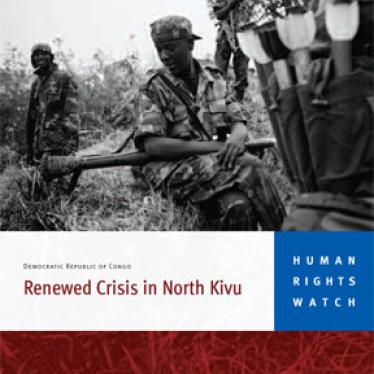As Congolese politicians and diplomats scramble to avoid full-scale war in the eastern province of North Kivu in the Democratic Republic of Congo, Human Rights Watch today issued a report documenting horrific murders, rape, and pillage by all parties to the conflict.
The 86-page report, “Renewed Crisis in North Kivu” details crimes against civilians by Congolese army soldiers, troops of renegade general Laurent Nkunda, and combatants of a Rwandan opposition force called the Forces for the Liberation of Rwanda (FDLR). The report documents an 18-month pattern of conflict where civilians bear the brunt of the abuses.
“Efforts to resolve the conflict have not yet brought relief for the local population,” said Anneke Van Woudenberg, senior researcher on the Congo for Human Rights Watch. “Politicians need to take action, right now, if Congolese citizens are to be protected and justice delivered for the crimes of the past.”
A shaky ceasefire between the Congolese army and Nkunda’s troops fell apart in late August and skirmishes between them have continued, despite the government’s announcement last week to extend an October 15 deadline for the dissident troops to join the national army.
Nkunda, who leads the dissident soldiers, says he is defending the interests of Congolese Tutsi, a minority group of which he is a member. He claims that the Tutsi of North Kivu, where he is based, will lack adequate protection if he permits his troops to be fully integrated into the national army and deployed to posts elsewhere in Congo.
His forces have also fought FDLR combatants, many of whom are Rwandan Hutu or members of Congolese groups related to the Hutu. At times the FDLR have fought against Congolese army troops but on other occasions, they have cooperated with soldiers of the government army. In recent operations, FDLR were said to be fighting with government troops against Nkunda.
In addition to killing and abducting scores of civilians, soldiers have engaged in widespread rape and in the looting and destruction of property. All forces used child soldiers and some commanders tried to prevent international child protection agencies from locating and removing children from their ranks.
Since late 2006 the conflict has displaced some 370,000 persons, adding to the burden on humanitarian agencies already trying to assist hundreds of thousands of others displaced by earlier stages of the fighting.
UN peacekeepers and the international community have been slow to respond to the crisis in North Kivu. On September 26 senior representatives from the United States, United Kingdom, France, Belgium and South Africa met in New York and acknowledged the risk of a wider crisis. They agreed to a roadmap meant to improve the security situation, including more robust action by UN peacekeepers.
There are currently over 17,000 UN peacekeeping troops in Congo. Spread throughout the enormous Congo, some 4,500 are based in North Kivu. Their mandate includes protecting civilians, including by the use of armed force if necessary.
“UN peacekeepers must use all their military and civilian resources to ensure protection for vulnerable civilians,” said Van Woudenberg. “They must denounce human rights violations when they occur and be ready to respond swiftly to new threats.”






